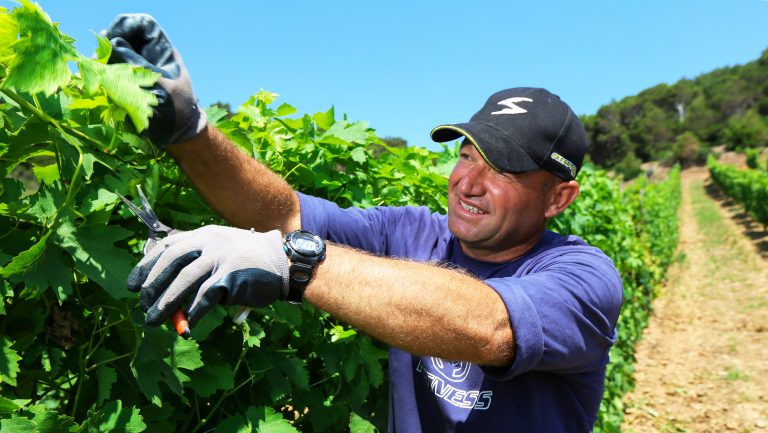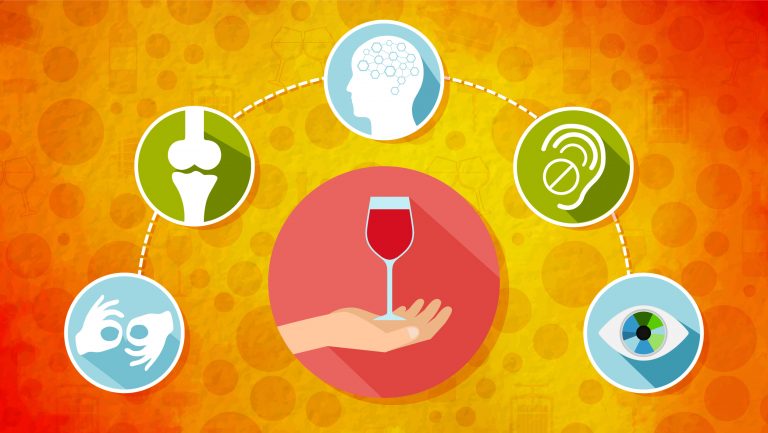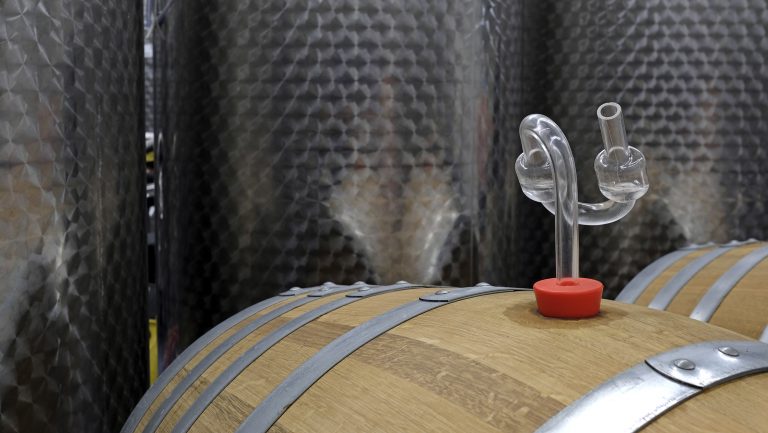The central canyon on Gorgona carves due east through the island, opening out to views of the azure waters and colorful fishing villages that make up the Ligurian Riviera. Nestled on a sloping hillside, in a bowl-shaped amphitheater, are vineyards with men at work. As part of the Tuscan Archipelago, Gorgona poses as tempting an island getaway as any. But it’s not a vacation destination. “Gorgona has been a prison island since 1869,” says Lamberto Frescobaldi, the 30th-generation winemaker and president of the renowned Florentine Frescobaldi Toscana empire, who oversees the winemaking program on the island.
Gorgona has become one of the world’s most progressive prisons, and it’s gained global recognition not only for its innovative institutional program but for the high-quality wines produced there. In addition to the penal colony, there’s a small village on the island. The men working the island’s vineyards are prisoners, found guilty of crimes as serious as murder. But the viticulture and winemaking isn’t exploitative prison labor. In fact, it’s an initiative intended to teach life skills to prisoners to help ease their transition from prison into the workforce.
In Italy, says Frescobaldi, “85 percent of people who are in jail, have been in jail before.” Having a prison record can make it difficult for these people to find work after getting out, and often, they end up becoming repeat offenders. Gorgona’s main goal in instituting the winemaking program was to cut back on the rate of recidivism in the prison community. “If prisoners do a job, get paid, and learn meaningful responsibility,” explains Frescobaldi, “recidivism drops.”

Don’t miss the latest drinks industry news and insights. Sign up for our award-winning newsletters and get insider intel, resources, and trends delivered to your inbox every week.
Gorgona’s winemaking project is just one of a unique crop of beverage and hospitality programs taking root around the world, providing a pathway to employment for jailed or formerly incarcerated people. While Gorgona has attracted the lion’s share of attention, other organizations, such as EDWINS Leadership and Restaurant Institute in Cleveland, L’chaim Foods in San Francisco, and Beyond Bars Akademia in Cape Town, South Africa, also run programs to help current and former inmates develop the skills they need to become winemakers, bartenders, sommeliers, restaurant managers, and caterers and to fill other roles within the hospitality industry.
Change at the Source
Baz Dreisinger, a professor at John Jay College of Criminal Justice in New York City and an expert on progressive prison reform, points out that the hospitality sector has a lot of potential to help enact change in this area. “Hospitality,” she says, “is not particularly threatening [as far as] society’s ideas about what [former inmates] are capable of doing.” Whether through winemaking and culinary programs within prison walls or restaurant and bartending programs that hire people post-incarceration, these innovative approaches can significantly benefit the all too often overlooked prison population.
It was Maria Grazia Giampiccolo, Gorgona’s prison director from 2011 to 2013, who had the maverick vision for the island’s failing 20-year-old vineyard. With the harvest looming in 2012, she hastily wrote a letter to established Tuscan wineries for help in training prisoners to work the vineyard. Only Frescobaldi Toscana answered her call—inspired by the idea, Lamberto Frescobaldi immediately signed on. And it was not just a one-off rescue—after two additional years of working on Gorgona, Frescobaldi drew up a 10-year contract, demonstrating Frescobaldi Toscana’s long-term commitment to the partnership.
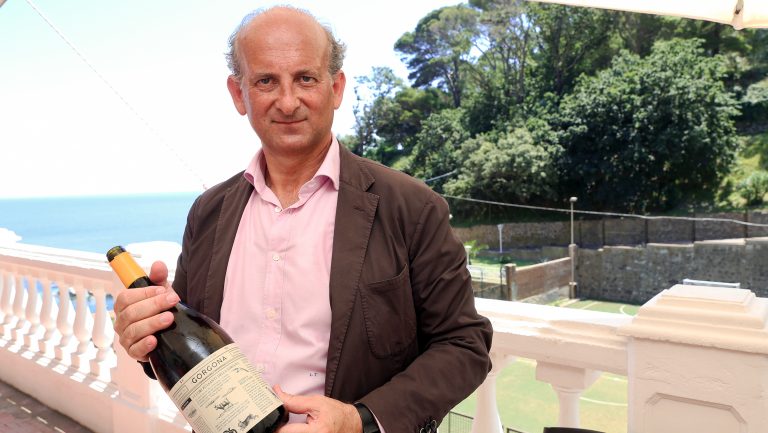
Frescobaldi Toscana’s yearly investment in the Gorgona winemaking project amounts to about US$113,425. This includes the land lease and annual salaries for up to 18 inmates chosen to work in the vineyards and winery, whom Frescobaldi must formally hire and oversee. For their seasonal work, inmates earn a monthly wage of around $1,700 (a rate of approximately $12.50 per hour), the same wage that equivalent positions at all Frescobaldi estates are paid.
The island is home to fewer than 100 inmates, who were transferred to Gorgona after maintaining a history of good behavior in other institutions, and its 400 acres are open to the inmates to roam and to do jobs other than working the vineyards, like tending vegetable gardens and raising livestock. The men even take turns visiting their families off island; they’re sometimes away for 15 days at a time. “In other [prisons], when you work you are a number,” says one of Gorgona’s prisoners during a break from pulling vine leaves. “Here you are a name—and a person.”
There are currently about 4,000 bottles of Gorgona’s barrel-aged white blend of Vermentino and Ansonica from 2016 available on the international market, along with nearly a thousand bottles of the clay-aged red blend of Sangiovese and Vermentino Nero from 2015. And the wines aren’t cheap: In the U.S., the Gorgona white retails for $150. The premium price tag reflects the wine’s quality, but it has another purpose, says Frescobaldi—“I want consumers to truly think about what they’re drinking.”
The program instills pride in the inmates who help produce the wine. Buyers, too, are enthusiastic about supporting this winemaking project and sharing the story of Gorgona with their clientele. Dino Borri, the head purchaser for Eataly U.S.A. in New York City, says, “We believe that the Frescobaldi project on Gorgona Island is absolutely of great social and environmental value.”
Creating Second Chances
Finding a job after prison can be a major hurdle. According to one analysis by the Prison Policy Initiative, a nonprofit research and advocacy group in Northampton, Massachusetts, formerly incarcerated people in the U.S. have an unemployment rate of 27 percent, far higher than the current national unemployment rate of 4 percent.
Another hospitality-driven initiative that’s working to shift the paradigm of imprisonment is EDWINS, a fine-dining French restaurant in Cleveland’s Shaker Square neighborhood that’s staffed by 40 individuals—all former convicts—matriculating through a six-month culinary school. Brandon Chrostowski, who founded the EDWINS Leadership and Restaurant Institute in 2007 and opened its flagship restaurant in 2013, says his motivation for developing the restaurant and educational program was simple. “Every human being,” he says, “regardless of their past, [should have] a chance for a fair and equal opportunity.”
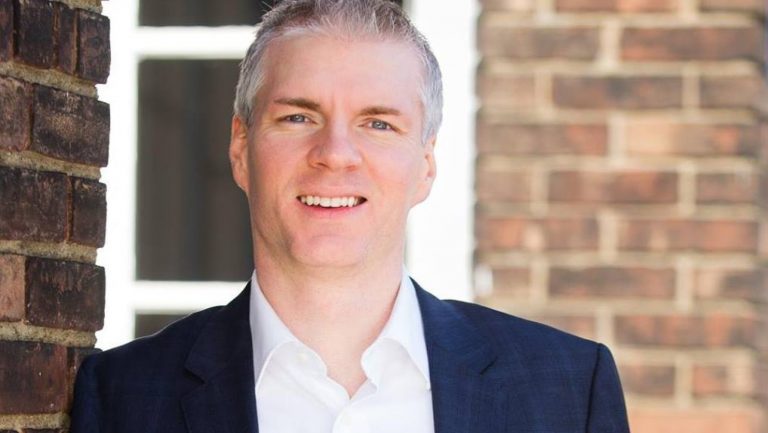
After he came close to being incarcerated himself for a drug offense as an adolescent, it was restaurant work that set Chrostowski on a new course. While he was working as a cook in New York City in the mid-2000s, at the now-closed restaurant Chanterelle, and studying to become a certified sommelier under the guidance of Master Sommelier Roger Dagorn, Chrostowski conceived the idea to use the industry that had changed his life to truly serve others. His goal was, and still is, he says, “to create the best culinary school in the country.”
Doug Collier, a 54-year-old EDWINS student, says that the program was his “first chance to be something as a professional human.” After eight years in prison, Collier is learning how to overcome a variety of reentry challenges. “Many of us,” he says, “come in here with some kind of chemical dependency,” though he says that he is now nearing nine years of sobriety. Collier adds that the EDWINS mantra, focused on “respecting the product,” encourages him and his fellow students to flourish while mixing drinks at the bar and during immersive sommelier training. Not only do graduates have an astounding 97 percent employment rate after graduation but, according to Chrostowski, also a minuscule 1 percent rate of recidivism.
Rebecca Charles, a 20-year hospitality veteran, ran the bar at EDWINS restaurant before spending a period of time in jail herself. In August 2018, Charles became the CEO of L’chaim Foods, a top-tier kosher catering company in San Francisco’s Sunset neighborhood that’s committed to working with former offenders. “Prison to CEO,” she says, “in less than one year!”
Charles explains that while a felony conviction isn’t a prerequisite at L’chaim, the company’s hiring practices are geared toward giving people a second chance. L’chaim has also partnered with the Delancey Street Foundation—a vocational and rehabilitation nonprofit with facilities in San Francisco and six other cities across the U.S. that serves formerly incarcerated people, substance abusers, and the homeless—to seek newly upskilled employees. Charles hopes that more restaurant owners will give prisoners returning to the workforce a chance.
Cape Town’s Beyond Bars Akademia (BBA) is a nonprofit organization dedicated to providing sommelier and bartender training to women recently released from Pollsmoor Prison to help them develop skills to support their reintegration into society and increase their chances of getting jobs. The organization was founded by the sommelier and entrepreneur Stephanie Simbo. After her late brother went to prison, Simbo says, she didn’t want to see anyone else’s mistake turn into a “lifelong sentence.” BBA also does advocacy work for women of color. Its six-month program, says Simbo, “provides accommodation, education, and job placement to our graduates.” This past year, 10 students completed BBA training. In 2019, Simbo is doubling her Cape Town cohort to 20 and will educate an additional 100 former women prisoners from Ivory Coast.
Changing the Conversation
These initiatives are proof that the beverage and hospitality industry can be a vehicle for change in the world of prison life and its aftermath. Not only do they help people gain employment upon release from prison and reduce recidivism, but they also serve to get the public thinking about the justice system in a constructive way. “Even some small and progressive [effort] is important,” says John Jay’s Dreisinger, “especially if it’s in the public space and changing the discourse.”
Those who work in hospitality have countless opportunities to teach lessons within the industry and to be conduits to the communities they serve. While a stigma is still involved in hiring former prisoners, these programs are worthy attempts to make a real difference in people’s lives. “I think the most important thing,” says L’chaim’s Charles, “is to see the individual, not just the conviction.”

Dispatch
Sign up for our award-winning newsletter
Don’t miss the latest drinks industry news and insights—delivered to your inbox every week.
Peter Weltman is a sommelier and entrepreneur based in San Francisco who explores native grapes from ancient sources. He writes for global food publications, gives speeches on wine activism, and creates immersive experiences about his movement, Borderless Wine. Find out where he’s reporting from next on Instagram.

